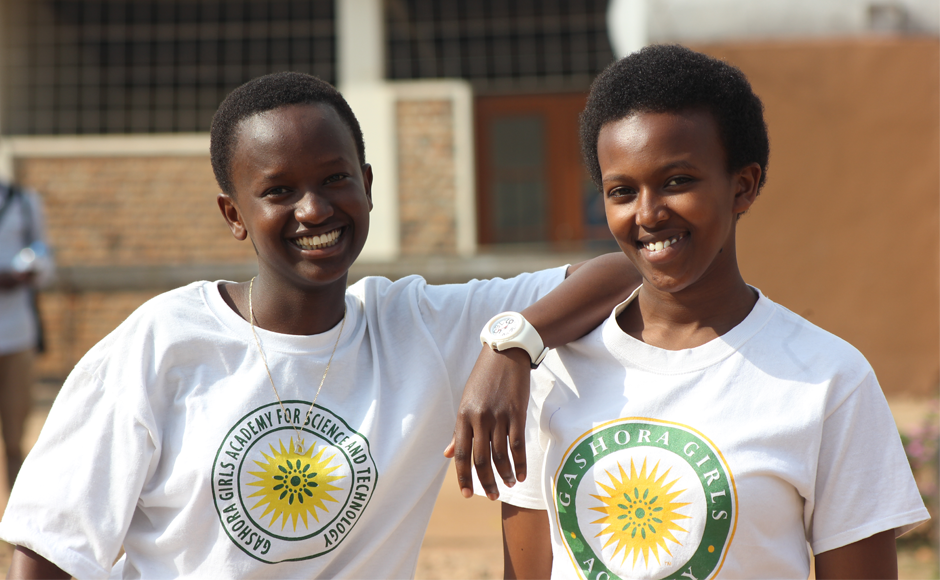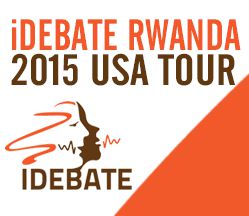PLU Hosts Rwanda’s Best Young Debaters

Image: Students from iDebate Rwanda will visit campus and hold a mock debate on Sept. 21. (Photo: iDebate Rwanda)
Free Public Debate Sept. 21 Addresses U.S. Intervention in Global Genocides
By Sandy Deneau Dunham
PLU Marketing & Communications
TACOMA, Wash. (Aug. 28, 2015)—During a two-day visit to Pacific Lutheran University in September, four of Rwanda’s best young debaters will immerse themselves in campus life—and present a moving, enlightening evening of personal storytelling and public debate.
The four students are part of iDebate Rwanda, a nongovernmental organization that uses debate to give young East Africans the tools to change their world by teaching them how to think critically, solve problems creatively and impact their society.
PLU is the second stop on the group’s 2015 U.S. tour, “Voices from the Post-Genocide Generation’’—and one of only two on the West Coast. The students’ visit is sponsored by PLU’s Holocaust and Genocide Studies minor, which includes the Kurt Mayer Endowed Chair in Holocaust Studies and the annual Powell-Heller Conference for Holocaust Education. (In Fall 2014, PLU became one of only a handful of universities nationwide to offer a minor in Holocaust and Genocide Studies.)
The debaters’ visit follows PLU’s October 2014 standing-room-only screening of Sweet Dreams, a documentary about Rwandan women working to rebuild their lives in the wake of the 1994 Rwandan genocide.
“This fall, with the support of the Kurt Mayer Endowment for Holocaust Studies, we focus on the efforts of young Rwandans to practice the art of argument in a society still struggling to make dissent normal, safe and nonviolent,” said PLU History Professor Beth Kraig, director of the Holocaust and Genocide Studies minor. “Silence often follows genocides and civil wars, as people live in fear and lack trust in others. The iDebate Rwanda program provides opportunities for breaking that silence and helps a new generation of Rwandans learn how to challenge one another and accept disagreement as necessary elements of a fair and robust democracy.”
Once on campus Sept. 21, the Rwandan students will visit an Argument and Advocacy class taught by Clinical Assistant Professor of Communication Justin Eckstein; pair with PLU student hosts involved in African Studies, Global Studies, Forensics, and Holocaust and Genocide Studies; and spend the night in a residence hall.
In the public keynote event at PLU at 7 p.m. Sept. 21, the visitors will conduct a mock debate on the question of whether the United States has a moral obligation to intervene physically when genocidal crimes occur in the world. They’ll also share their own personal stories and answer audience questions.
Started in 2012 by a group of Rwandan students, iDebate Rwanda aims to build a national debating community, enabling young leaders to discuss public policy, disagree in a peaceful way, passionately oppose ideas without violence, learn communication skills and access international scholarships.
The East African country of Rwanda is best known for the 1994 genocide against the Tutsis, one of the worst in the history of humankind: In 100 days, 1 million lives were lost. According to a report on foreignpolicy.com, many members of iDebate Rwanda lost their extended families during the genocide. And, “although most were born three or four years after the genocide, none have escaped its shadow.”
Jean Michel Habineza, one of the founders of iDebate, told the website, “The biggest victims of genocide were us — the young people — because we are all bearing the consequences of something that we did not create.”
The four visiting debaters had to win a competition in Rwanda to be selected for the U.S. tour, which begins Sept. 6 at Pepperdine University and continues across the country through October.
“PLU is the perfect place for the young Rwandan debaters to visit, as our community, through programs like My Language/My Choice, emphasizes the importance of cultivating empathy and courage as lifelong habits,” Kraig said.



